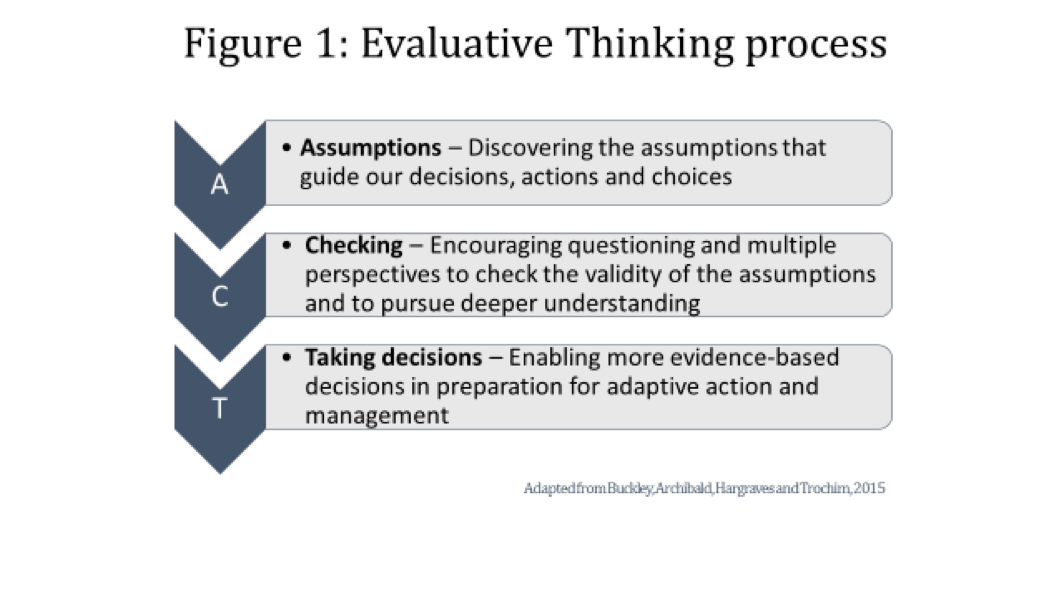Greetings! We’re Guy Sharrock (Catholic Relief Services), Tom Archibald (Virginia Tech), and Jane Buckley (JCBConsulting). Following a much earlier aea365 post dated April 29, 2012, Evaluative Thinking: The ‘Je Ne Sais Quoi’ of Evaluation Capacity Building and Evaluation Practice, we’d like to describe what we are learning from our evaluative thinking (ET) work in Ethiopia and Zambia.
A paradigm shift is taking place in the aid community away from linear models of change to more dynamic, reflective, and responsive models. This requires adaptive management. It necessitates “teams with skills and interests in learning and reflection” and a recognition that “evaluative thinking is indispensable for informed choices.”
Defined as critical thinking in the context of M&E motivated by an attitude of inquisitiveness and a belief in the value of evidence, the process of ET is summarized in this figure:
With Catholic Relief Services in Ethiopia and Zambia, we have organized and led ET capacity-building interventions over three years that take participants through a complete ET process. We work with three audiences: locally-based partners who have daily contact with rural community members, program leaders who oversee technical program management, and country leadership who set the tone for learning and reflection.
Results to date are encouraging. After embedding ET techniques in existing work processes, staff report there is now more substantive and productive dialogue during regular monitoring and reflection meetings. This arises from the improved quality of inquiry whereby the perspectives of field staff, volunteers, project participants, program managers can generate new insights to inform program decisions. In turn, this enriches the content of reporting and communication with donors and other key stakeholders.
Hot Tips:
- Ensure a safe environment for participants engaged in potentially contentious conversations around assumptions.
- Supportive leadership is a pre-requisite in the febrile atmosphere of a results- and target-driven culture that can all-too-easily crowd-out more reflective practice.
- Distinguish between questioning and criticizing to encourage debate and transparency.
Lessons Learned:
- A trusting relationship with the donor is critical for creating safe spaces for learning.
- Take time to listen and to find ways to engage frontline staff in decision-making.
- Encourage curiosity by suspending the rush to an easy conclusion and finding tangible ways to manage uncertainty.
Rad Resources:
- Adaptive Management: What it means for CSOs: A report written by Michael O’Donnell in 2016 for
- Working with assumptions: Existing and emerging approaches for improved program design, monitoring and evaluation: A December 2016 Special Issue of Evaluation and Program Planning.
- Realising the SDGs by reflecting on the way(s) we reason, plan and act: The importance of evaluative thinking: An October 2016 brief from IIED and EvalPartners.
Do you have questions, concerns, kudos, or content to extend this aea365 contribution? Please add them in the comments section for this post on the aea365 webpage so that we may enrich our community of practice. Would you like to submit an aea365 Tip? Please send a note of interest to aea365@eval.org . aea365 is sponsored by the American Evaluation Association and provides a Tip-a-Day by and for evaluators.


This is great! Please continue sharing your learning!